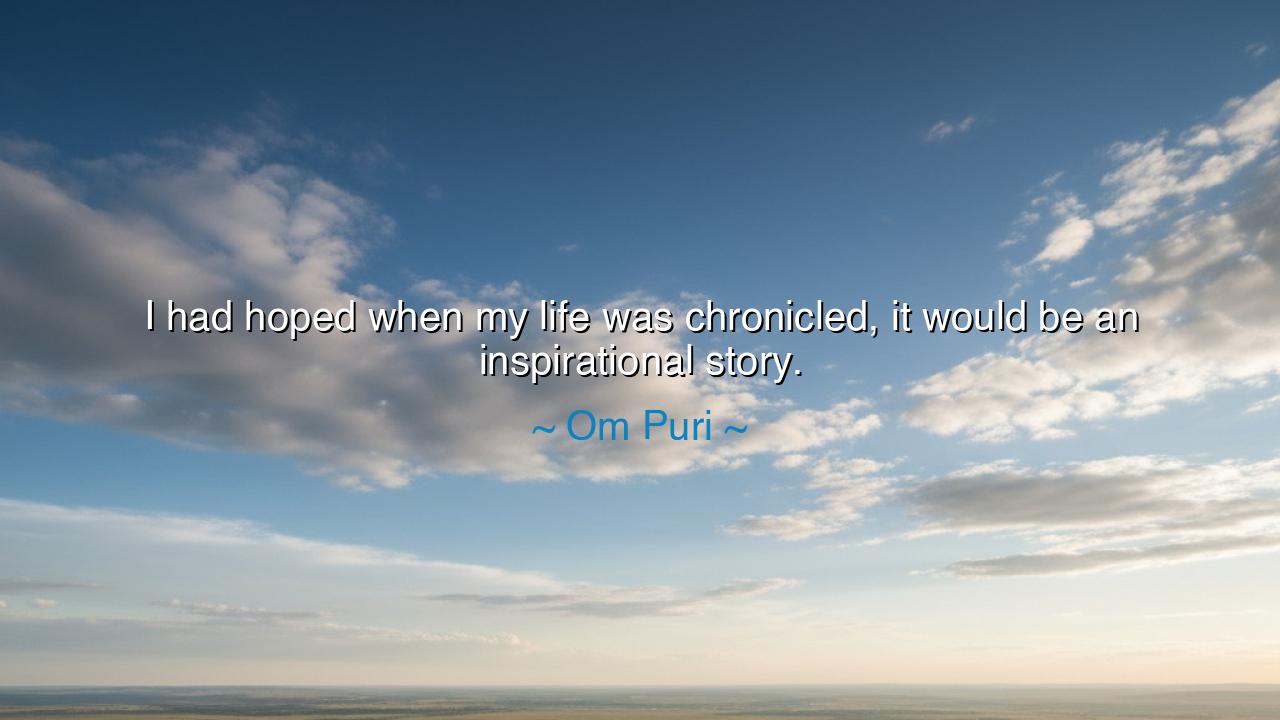
I had hoped when my life was chronicled, it would be an






In the words of Om Puri, a man whose art spoke of truth and humility, we find a reflection that pierces the heart of every seeker of meaning: “I had hoped when my life was chronicled, it would be an inspirational story.” These words, soft yet weighted with yearning, reveal not pride but the ancient longing that dwells in every human soul — the desire that one’s life, when remembered, might stand as a light for others. Puri, who rose from hardship to become one of the most respected actors of his generation, speaks here not only for himself, but for all who labor through struggle, hoping that their pain might be transformed into purpose.
For Om Puri, this hope was born from a life that began in shadows. Raised in poverty, shaped by loss, and tested by the trials of survival, he walked a path that few could endure. Yet from those humble beginnings, he carved a destiny that spanned continents, bridging the worlds of Indian cinema and international film. His was a journey not of luxury, but of discipline, resilience, and truth — the hallmarks of a soul that refused to be subdued by circumstance. Thus, when he speaks of wanting his life to be “inspirational,” it is not the boast of vanity, but the quiet prayer of a man who wished that his own endurance might awaken courage in others.
The ancients would have understood this hope well. In every age, men and women have sought not immortality of the flesh, but of meaning. The philosopher Marcus Aurelius wrote that the true measure of life is not how long one lives, but how deeply one acts in harmony with virtue. Heroes of old, from Odysseus to Arjuna, endured suffering not for glory, but so that their stories might teach those who came after. In the same way, Om Puri’s words echo this eternal principle: that the struggles of one life, when faced with dignity, can serve as a lamp for countless others walking in darkness.
Yet beneath the nobility of his statement lies something even more tender — the awareness that one cannot control how one’s story is told. “When my life was chronicled,” he says, with that bittersweet note of resignation. The chronicle, once the domain of the poet or the historian, is today written by the world — by public opinion, by gossip, by fleeting memory. Puri knew, perhaps, that fame is a fragile mirror, one that may reflect not the truth of the soul but the distortions of society. And so, his hope that his life would be seen as inspirational was also a plea — that the essence of his journey not be lost amid the noise, that people remember the spirit, not just the scandal, the art, not just the image.
There is an old story from the East about a humble monk who, after a lifetime of quiet service, asked his disciples not to praise him when he was gone, but to tell the truth of his efforts — his failures, his doubts, and his perseverance. “For in my weakness,” he said, “others may find their strength.” This, too, is the spirit of Om Puri’s wish. He did not seek perfection in his legacy, but honesty. He wished that his tale might remind others that greatness is not the absence of flaw, but the triumph over limitation; that the inspiration of a life lies not in its victories alone, but in its endurance, its compassion, and its humanity.
In his artistry, Om Puri became a mirror for millions — portraying characters of raw, ordinary truth, men shaped by toil and tenderness. His performances, stripped of glamour, carried the quiet nobility of the common soul. And so his hope — that his own life might inspire — is fulfilled not in monuments or titles, but in every person who saw in his work the reflection of their own struggle, their own possibility. He may have wondered whether his chronicle would be told with fairness, but in truth, the story of the heart writes itself across generations, and such stories do not fade.
So, dear listener, take this lesson from the words of Om Puri: live your life as though it were a story worth passing down. Do not wait for others to make it inspirational — make it so through your actions, your integrity, your endurance. Understand that the chronicle of your life is written not in ink, but in the hearts you touch, the kindness you show, the honesty with which you walk your path. You may not choose how the world remembers you, but you can choose how you live — and that, in the end, is what makes a life truly inspirational.
Let every day, then, be your chapter of courage. Face your struggles with dignity. Transform your scars into symbols of strength. For when your story is told — by your children, your friends, or by time itself — may it, like Om Puri’s, whisper the same enduring truth: that though life is fleeting, inspiration is eternal, and the smallest act of resilience can echo like a song through the ages.






AAdministratorAdministrator
Welcome, honored guests. Please leave a comment, we will respond soon